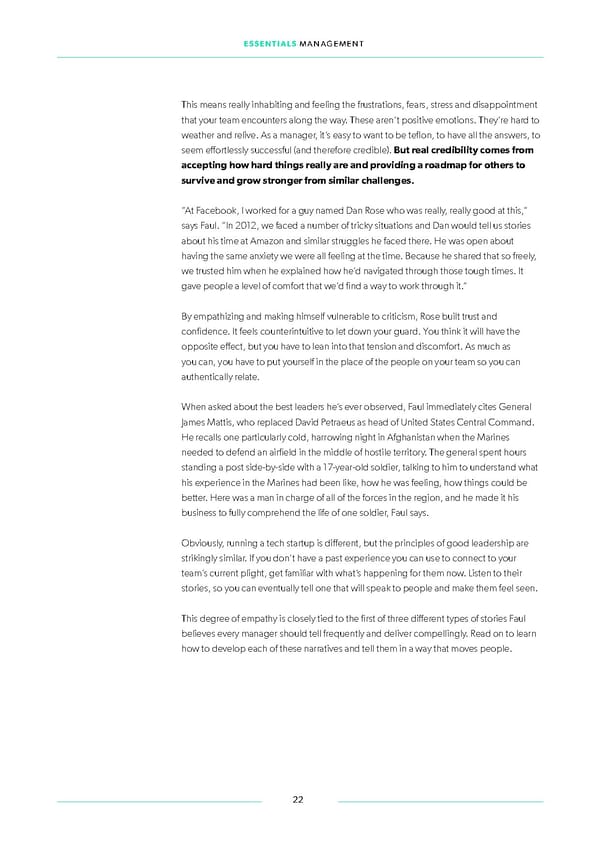ESSENTIALS MANAGEMENT This means really inhabiting and feeling the frustrations, fears, stress and disappointment that your team encounters along the way. These aren’t positive emotions. They’re hard to weather and relive. As a manager, it’s easy to want to be telfon, to have all the answers, to seem effortlessly successful (and therefore credible). But real credibility comes from accepting how hard things really are and providing a roadmap for others to survive and grow stronger from similar challenges. “At Facebook, I worked for a guy named Dan Rose who was really, really good at this,” says Faul. “In 2012, we faced a number of tricky situations and Dan would tell us stories about his time at Amazon and similar struggles he faced there. He was open about having the same anxiety we were all feeling at the time. Because he shared that so freely, we trusted him when he explained how he’d navigated through those tough times. It gave people a level of comfort that we’d ifnd a way to work through it.” By empathizing and making himself vulnerable to criticism, Rose built trust and conifdence. It feels counterintuitive to let down your guard. You think it will have the opposite effect, but you have to lean into that tension and discomfort. As much as you can, you have to put yourself in the place of the people on your team so you can authentically relate. When asked about the best leaders he’s ever observed, Faul immediately cites General James Mattis, who replaced David Petraeus as head of United States Central Command. He recalls one particularly cold, harrowing night in Afghanistan when the Marines needed to defend an airifeld in the middle of hostile territory. The general spent hours standing a post side-by-side with a 17-year-old soldier, talking to him to understand what his experience in the Marines had been like, how he was feeling, how things could be better. Here was a man in charge of all of the forces in the region, and he made it his business to fully comprehend the life of one soldier, Faul says. Obviously, running a tech startup is different, but the principles of good leadership are strikingly similar. If you don’t have a past experience you can use to connect to your team’s current plight, get familiar with what’s happening for them now. Listen to their stories, so you can eventually tell one that will speak to people and make them feel seen. This degree of empathy is closely tied to the ifrst of three different types of stories Faul believes every manager should tell frequently and deliver compellingly. Read on to learn how to develop each of these narratives and tell them in a way that moves people. 22
 Essentials Management First Round Capital Page 21 Page 23
Essentials Management First Round Capital Page 21 Page 23